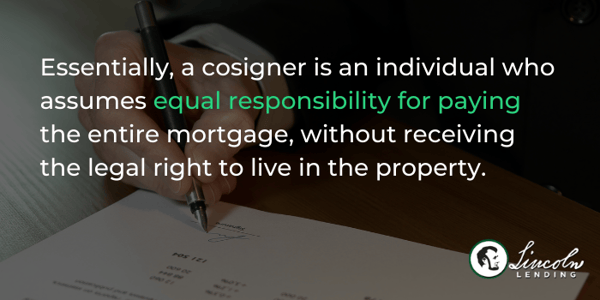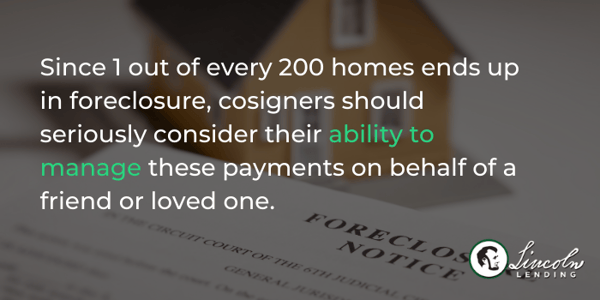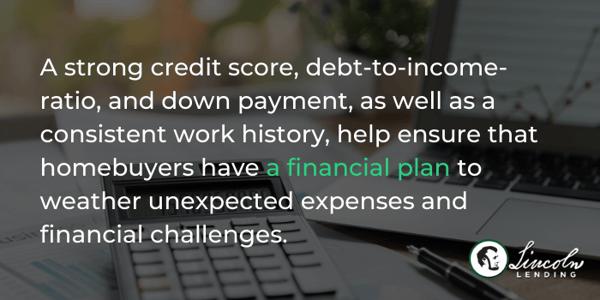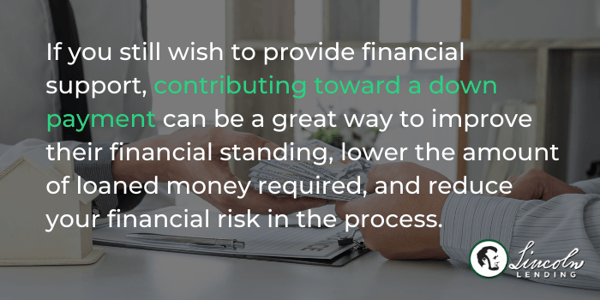Buying a home is not the easiest process in the world, but there’s a good reason for that.
The process of qualifying for a mortgage is intended to help both the lender and the buyer understand the buyer’s readiness for the financial and emotional investment of homeownership. However, the result can be confusing and frustrating for those whose applications are denied due to limited credit, low FICO score, or previous financial troubles.
These individuals are not alone. In fact, according to research, over 20% of mortgage applicants with credit scores between 580 and 619 are denied, even if they offer a down payment of 32%. That percentage of denied applicants increases to 39% for those with credit scores lower than 580.
As a result, many prospective homebuyers look to a cosigner to improve their likelihood of a successful mortgage application, asking friends or family members to support them in the process. And it may be tempting to say “yes,” – after all, who doesn’t want their loved one to achieve the American Dream?
But there are some serious risks to this strategy, both for the homebuyer and the cosigner. Before you agree to cosign, let’s look at the risks of this approach, as well as how cosigning can potentially work against the long-term success of the homebuyer.
Why Might Someone Need a Cosigner?
In May of 2020, one in every 15,556 housing units had a foreclosure filing. While that may seem high, it actually represents a decrease from previous years.
Foreclosure represents a real risk to even the most responsible homeowners due to circumstances such as illness, loss of employment, death of a spouse, or divorce.
With that in mind, lenders carefully evaluate the financial and employment history of all prospective homebuyers with the goal of choosing only the applicants with the strongest long-term budgetary outlook.

Typically, mortgage applications are reviewed on three main criteria:
- Credit Score
- Debt-to-Income-Ratio
- Cash to Close
Debt-to-income-ratio predicts if the prospective homebuyer has the financial bandwidth to take on additional debt. Meanwhile, cash to close, or the buyer’s down payment, is also important since the amount of the loan reflects the difference between the down payment and the selling price.
However, of all of the factors considered, lenders usually scrutinize the credit score the most. Credit score measures an applicant’s history of on-time payments and the length of their credit history.
While there are immediate steps that home seekers can take to begin improving their credit score, late payments can remain on a credit report for up to seven years.
Since a less-than-stellar credit history can result in a declined application, lenders will sometimes suggest a cosigner as a way to quickly improve the financial standing of a homebuyer.
What is a Cosigner?
A cosigner is not a reference or a roommate, and they are definitely not responsible for only half of the mortgage.
Essentially, a cosigner is an individual who assumes equal responsibility for paying the entire mortgage, without receiving the legal right to live in the property. As a result of accepting this responsibility, the financial history and credit score of the cosigner are considered alongside those of the potential homebuyer.

This arrangement can be beneficial in the eyes of the lender since it ensures that, should the homebuyer default in their payments, the cosigner will continue to pay the mortgage on their behalf. Since this is a serious responsibility, many mortgage lenders require that cosigners be related to the applicant, though there are some provisions for domestic partners and other close relationships.
Regardless of the connection between the cosigner and the homebuyer, it’s an arrangement that can place the cosigner in a difficult financial position, potentially damaging relationships in the process.
The Potential Risks of Cosigning
In addition to the homebuyer, a cosigner is another individual who is 100% responsible for paying the loan amount. If the homebuyer is suddenly unable to pay, the cosigner becomes immediately responsible for all monthly payments.
Since 1 out of every 200 homes ends up in foreclosure, cosigners should seriously consider their ability to manage these payments on behalf of a friend or loved one.

Inability to manage this expense will result in the same legal consequences for the consigner as for the homeowner, including damaged credit, foreclosure, and a potential bankruptcy.
Even if the worst-case-scenario does not take place, the cosigner’s debt-to-income ratio is impacted from the moment they sign the agreement. This means that, though they are not entitled to ownership of the home, their financial history will reflect the full debt burden.
While there may be some situations in which this decision makes sense, it is an extraordinary risk to undertake, even on behalf of a responsible family member, such as a child or parent.
Additionally, it is important to keep in mind that the foreclosure process can result in stress and depression for the homeowner, and that cosigning for an individual who lacks the independent readiness for homeownership can actually result in this outcome.
Instead, there are better, safer, and more directly empowering ways to assist loved ones with the home buying process.
Playing It Safe
Sometimes the expectations of the home buying process can seem a little unfair. Homebuyers with average credit may be denied loans, while those with “good” credit may not qualify for the best interest rates.
But there is a logic to the process.
As we’ve seen, many home purchases end up in foreclosure – which is expensive to lenders and disastrous for homeowners. With this in mind, the challenges of qualifying for a home loan are actually designed to prevent foreclosure and help all parties succeed.
A strong credit score, debt-to-income-ratio, and down payment, as well as a consistent work history, help ensure that homebuyers have a financial plan to weather unexpected expenses and financial challenges.

And there will be plenty unforeseen expenses to navigate. Homeowners can expect to spend 1% to 4% of the home’s value on annual maintenance for the life of the home. Economic uncertainty, career changes, and other variables can pose other challenges to the mortgage outlook of many homeowners.
While this may seem like an argument for the “back up plan” of a cosigner, it might be a better argument for improving the financial position and emergency savings of the homebuyer.
And, while it’s unlikely that a person can completely change his or her financial situations overnight, it can be done over time.
So, what can you do to support your friend or loved one, instead of cosigning?
- Help them increase their down payment
- Encourage them to improve their debt-to-income ratio by paying down outstanding debts
- Advise them to improve their credit score
- Provide them with educational resources on homeownership, budgeting, and mortgage approval
Each strategy above will result in a measurable improvement in your loved one’s mortgage readiness.
If you still wish to provide financial support, contributing toward a down payment can be a great way to improve their financial standing, lower the amount of loaned money required, and reduce your financial risk in the process. With a little encouragement, you can help your loved one achieve their homeownership dream, while giving them the gift of a more secure future.

If you or a loved one are considering purchasing a home and have questions about your loan eligibility or whether you should use a cosigner, get in touch. During a one-on-one Home Loan Coaching Session, we can talk about your unique situation and help you plan for a successful home buying journey.
